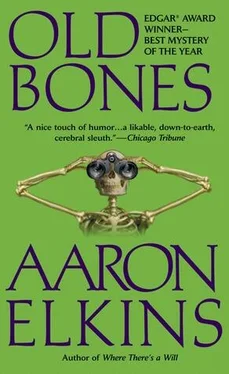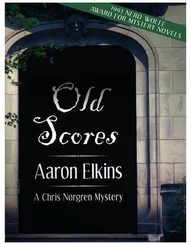Aaron Elkins - Old Bones
Здесь есть возможность читать онлайн «Aaron Elkins - Old Bones» весь текст электронной книги совершенно бесплатно (целиком полную версию без сокращений). В некоторых случаях можно слушать аудио, скачать через торрент в формате fb2 и присутствует краткое содержание. Жанр: Классический детектив, на английском языке. Описание произведения, (предисловие) а так же отзывы посетителей доступны на портале библиотеки ЛибКат.
- Название:Old Bones
- Автор:
- Жанр:
- Год:неизвестен
- ISBN:нет данных
- Рейтинг книги:3 / 5. Голосов: 1
-
Избранное:Добавить в избранное
- Отзывы:
-
Ваша оценка:
- 60
- 1
- 2
- 3
- 4
- 5
Old Bones: краткое содержание, описание и аннотация
Предлагаем к чтению аннотацию, описание, краткое содержание или предисловие (зависит от того, что написал сам автор книги «Old Bones»). Если вы не нашли необходимую информацию о книге — напишите в комментариях, мы постараемся отыскать её.
Old Bones — читать онлайн бесплатно полную книгу (весь текст) целиком
Ниже представлен текст книги, разбитый по страницам. Система сохранения места последней прочитанной страницы, позволяет с удобством читать онлайн бесплатно книгу «Old Bones», без необходимости каждый раз заново искать на чём Вы остановились. Поставьте закладку, и сможете в любой момент перейти на страницу, на которой закончили чтение.
Интервал:
Закладка:
What the pictures hadn’t prepared him for was its raw, gray vigor. Despite the stone traceries, the spires, the arches, Mont St. Michel was rudely masculine; hard, plain, virile. The towers didn’t soar, they surged and thrusted; the whole crowded rock was like a living animal, bunched, powerful, restlessly alert.
"So where’s this shrine of French gastronomy?" asked John, who never stayed awed very long. "Even an omelet’s starting to sound good."
But Mere Poularde was closed until the season officially opened on April 1. So were most of the other restaurants on the Grand Rue. They worked their way up the steep, narrow street, growing increasingly pessimistic about the prospects for lunch. "We just can’t come to a place like this and eat in one of these crummy fast-food places," Gideon said, referring to the tiny shops where chilled-looking vendors sold lukewarm pizza slices and stale-looking sandwiches wrapped in plastic.
"I can," John said, then stopped abruptly. "Hey, I just thought of something." He chirped with laughter. "Wow."
"What?"
"Well, Guillaume’s will isn’t worth a damn. Not if you’re right about those bones."
Gideon stared at him. As obvious as it was, it hadn’t occurred to him. "Of course! It wasn’t really Guillaume who made it out, was it? Whoever it was, he didn’t have any right to give Guillaume’s property away."
"That’s the way I see it," John said, starting to walk again. "This gets weirder by the minute. All those people who got something in the will-they’re not entitled to it. Boy, there’s another great reason for murder right there."
"How do you mean? How would they benefit from killing him?"
"Not him, you."
"Oh," Gideon said. "Me."
He shook his head wearily. There were too many motives; that was the problem, just as Joly had said, and they kept coming up with new ones. If the invalid will really was behind everything in some way-and that made considerable sense-then any of the heirs who knew Guillaume hadn’t really been Guillaume might well have wanted Gideon dead. But did any of them know? And even if they did, where did Claude come into it? Why kill him? Not because he’d threatened to challenge the will, certainly; Bonfante had made it clear that he couldn’t have brought it off.
Was is possible that Claude knew about Guillaume’s murder in 1942 and someone killed him to keep him quite? Not very likely. If he’d known he’d have told a long time ago, instead of fuming for forty years over a will he knew to be fraudulent.
And what about the pretend-Guillaume, with only a year to live? Assuming he was murdered (which even Gideon was beginning to have doubts about), who would benefit in any important way by moving up his death a few months?
No, there was something more than the will involved; more than vengeful hatred of Claude too. Something they were all missing, something at the heart of it that would make everything fall into place. That it had to do in some way with the dark affairs in the cellar of Rochebonne in 1942 he had little doubt. But what, exactly?
"Have you noticed," he muttered to John, "that the more we figure out, the less we seem to know?"
At this point, happily, they came upon a sight that warmed them both: an open restaurant, a mellowed sixteenth-century inn with a hanging, filigreed metal sign over the door. Le Mouton Blanc, it said, and underneath, appropriately, was a picture of a contented-looking white sheep. It was the kind of place about which John might have had doubts, but as they approached it, two people came out, and the aroma of pommes frites that wafted out after them was more than enough to convince him.
The combination of smells inside was even better, notwithstanding the usual fug of cigarette smoke: steamed seafood, fried potatoes, roasted meat. It was probably just the way it smelled in 1600, Gideon thought with pleasure, except, of course, for the tobacco, which wouldn’t have arrived from North America for another few decades. It was about half-full, and at a table near the back were Ray and Claire, with Sophie and Ben Butts.
"Come join us!" Ben shouted as soon as they walked in.
They threaded their way between the tables. "I don’t know; you look pretty crowded already," Gideon said with a smile.
"Oh, no, please, we can easily make room," Ray said, looking glad to see them, and Claire murmured something similar.
"Sure," Ben said. "Unless you’re rubbin’ elbows, eatin’s just stokin’."
"And who said that?" Sophie asked.
"I believe it was my cousin Bobby Will."
"I thought your cousin was Billy Rob."
Ben looked thoughtfully at her. "No, Billy Rob’s my uncle on my mother’s side; married to Clara Bea. Bobby Will’s my cousin on my father’s side-Willie Bob’s boy."
Amid general laughter, a couple of chairs were taken from nearby tables and Gideon and John squeezed in. No one had ordered food yet, but they were almost through a bottle of white wine, and a new bottle with two more glasses was brought. Selection de l’Hotel, Vin de Table, the modest label said, but it turned out to be a better-thanordinary Chablis.
Gideon lifted his glass in a salute. "So," he said, "what brings you to Mont St. Michel?"
He felt at ease with these four. Of all the people at Rochebonne they were the ones he trusted most: Ray, sweet-tempered and earnest, and altogether above suspicion; gentle Claire Fougeray, thin and pallid, but with a ruddy heat in her cheeks that he guessed was due less to the wine than to Ray’s proximity; Sophie Butts, frank and solid; Ben, with his easy way of meandering between homespun adages and lawyerly good sense. If one of them turned out to be a murderer, he was going to be awfully annoyed. And surprised.
It was Ben who answered. "We came down to pick up Guillaume’s car and take it back. Seemed like a good excuse for us all to get out of the house for a while, take a train ride, see the Mont before we left." Smiling, he raised his glass to toast the others.
"Are you taking off?" John asked. "I thought Joly wanted you to stay."
"Can’t," Ben said. "There are big things on the menu at Southwest Electroplating. Two-million-dollar comparable-worth suit coming up. Anyway, Joly told us from the start we could go after tomorrow. He knows where to find us if he needs us."
"Ben and I are catching a ten o’clock flight from Paris tomorrow night," Sophie said. "These two will be leaving the next morning, by train from Dinan."
Gideon looked with interest at Ray and Claire. "You’re going together?"
"They certainly are," Sophie said happily.
"Oh," said Ray, and cleared his throat. "Well."
"Raymond is being kind enough to accompany maman and me to Rennes," Claire explained primly, looking down at her glass. "After that he will be our guest for a few days."
"Well, you know, I don’t have to be back at Northern Cal until next week," Ray said, "so I thought…you know." He tugged at the ends of his bowtie and shone with inarticulate happiness.
Sophie took a healthy swallow of wine and put down her glass. "I don’t know about anyone else, but I could eat a horse. Claire, dear, why don’t you order for us? Is that all right with everyone?"
That was fine with everyone, and Claire, who seemed in her retiring way to be pleased with a role in the limelight, consulted at length with the waiter before settling on a three-course meal of traditional Norman cuisine. By the time the ordering was done, most of the new bottle of wine had been drunk and the level of conviviality was high. There was a blaze in the fireplace, and outside a passing rain had left the cobblestones of the Grand Rue gleaming, making it easy for Gideon to enjoy the pleasant illusion of being a sixteenth-century traveler, warmly ensconced in a fine inn among companionable comrades.
Читать дальшеИнтервал:
Закладка:
Похожие книги на «Old Bones»
Представляем Вашему вниманию похожие книги на «Old Bones» списком для выбора. Мы отобрали схожую по названию и смыслу литературу в надежде предоставить читателям больше вариантов отыскать новые, интересные, ещё непрочитанные произведения.
Обсуждение, отзывы о книге «Old Bones» и просто собственные мнения читателей. Оставьте ваши комментарии, напишите, что Вы думаете о произведении, его смысле или главных героях. Укажите что конкретно понравилось, а что нет, и почему Вы так считаете.












